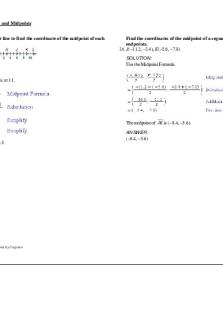SOC-100 Deviance and Its Consequences 106 out of 116 points PDF

| Title | SOC-100 Deviance and Its Consequences 106 out of 116 points |
|---|---|
| Course | Everyday Sociology |
| Institution | Grand Canyon University |
| Pages | 4 |
| File Size | 59 KB |
| File Type | |
| Total Downloads | 64 |
| Total Views | 137 |
Summary
Essay for Topic 3, Deviance and Its Consequences, points of 106 out of 116....
Description
1 SOC-100 December 13, 2020 Lisa Covington Deviance and Its Consequences According to Henslin (2016), sociologists describe deviant behavior as any violation of society's norm (pg. 196). Emile Durkheim's perspective of deviance being a part of society and actions that are considered deviant depends on the circumstances of its occurrence (Vejar, 2019). In the article, "Good Girls Gone Bad: Race and Gender in Oxygen's the Bad Girls Club," the author Mercer (2012) defines reality television as a genre program that cast members of ordinary people and present unscripted actual dramatic situation (pg. 1). Oxygen Network's reality TV show, Bad Girls Club, originated in 2000 was the guise of reality television with different demographics of girls living in a mansion. In the Bad Girls Club's first season, Ripsi Terzian was extremely intoxicated from alcohol consumption and physically attacked two other females in the home. Ripsi was starting to fall asleep at two different times, but she would abruptly get up, continue to attack Kerry, or break things in the house. In another scene, Ripsi entered Jodie's bedroom, who was sleeping, jumped on her, and started to physically attack Jodie by having a grip of her hair and punching her. Studies indicated that alcohol consumption is frequently in television that one who participates in one type of deviance would engage in other deviant behaviors (Flynn et al., 2015). The group's reaction that led to conformity and social control of the deviant behaviors revealed that the deviance was unacceptable. In the end, the cast members of the reality show Bad Girls Club convey deviant behaviors as not being accepted even by the group's demographic and reaction, with their ability to control the deviance with negative sanction.
2 Therefore, the show's demographic cast member consists of only female gender ranging from ages 21 to 35, from different ethnic backgrounds and several demographic groups like Jodie Howell, a conservative office worker who was also a Playboy Bunny. In season one, Ripsi was a belligerent drunk who was physically attacking Kerry. The three women, Ripsi, Jodie, and Kerry, were Caucasian with similar wealthy backgrounds (Mercer, 2012). The other group who witnesses the deviant behaviors were two Caucasian women; Aimee Landi, 24-year-old, taught by her father to stand up for herself, and 22-year-old Zara Sprinkle from New York (Fandom, N.d.). Two African American women, both from Atlanta, Georgia, witnessed the attack; Leslie Ramsue, a 24-year-old, exotic dancer and 25-year-old, Ty Colliers a repeated offender that was raised in the foster care system (Fandom, N.d.). Moreover, each member of the group had comparable and different reaction to the deviant behavior. According to Henslin (2016), labeling theory consists of the view that labels people to channel their behaviors towards deviance or conformity (pg. 202). For instance, Aimee, a person taught by her father to stand up for herself, pulled Ripsi out of the pool after being pushed into the pool by Kerry (RealityTvFight, 2010). Aimee stated, "I should've left her, because that is messed up, you just don't attack people for no reason" (RealityTvFight, 2010). Even with Ripsi deviant behavior, Aimee made a moral and safe decision by pulling Ripsi, who was intoxicated and appeared to be drowning, out of the pool. The actual tents comprising moral structure can be based on several subjective factors (Vejar, 2019). Aimee, whose moral principle was to pull Ripsi out of the pool, was the right and safe thing to do. Furthermore, the group members of season one was able to control deviant behavior through social control by enforcing norms with the consequences of negative sanctions (Henslin, 2016). The negative sanction consists of the disapproval for the deviant behavior that was
3 displayed. Due to Ripsi's rampage and assault towards others, a house meeting was held, and the other cast member voted for her to leave the home. The consequence of the negative sanction that Ripsi received was being removed from the home and the show in its entirely on the third episode of season one. Finally, cast members of the Bad Girls Club demonstrate the rejection of deviance even with different demographics and reaction, which the deviant behavior was able to be controlled by the group. Ripsi was intoxicated from alcohol consumption and display deviant behavior by physically attacking two other cast members. Even though with different demographics labeled by the network and Ripsi deviate behaviors, cast members like Aimee made a moral decision by saving Ripsi from drowning in the pool. Due to the deviance, the group was able to control the behavior by voting Ripsi out of the home. Ripsi received the negative sanction of being ordered to leave the home. Deviance is a part of society, but there are consequences of where deviant behavior occurs.
4 References Fandom. (N.d.). Bad girls club season 1. Fandom. Retrieved from https://badgirlsclub.fandom.com/wiki/Season_1 Flynn, M. A., Morin, D., Park, S.-Y., & Stana, A. (2015). “Let’s Get This Party Started!”: An Analysis of Health Risk Behavior on MTV Reality Television Shows. Journal of Health Communication, 20(12), 1382–1390. https://doiorg.lopes.idm.oclc.org/10.1080/10810730.2015.1018608 Henslin, J. M. (2016). Social structure and social interaction. In Grand Canyon University (Ed.) Essentials of Sociology: A Down-To-Earth Approach, Twelfth Edition. Available from http://www.gcumedia.com/digital-resources/pearson/2016/essentials-ofsociology_ebook_12e.php Mercer, E. (2012). "Good Girls Gone Bad: Race and Gender in Oxygen's the Bad Girls Club." Inquiries Journal/Student Pulse, 4(07). Retrieved from http://www.inquiriesjournal.com/a? id=668 RealityTvFight. (2010, December 01). Bad girls club S1 fight Ripsi vs. Kerry and Jodie [Video]. YouTube. https://youtu.be/sl5jLfi1u1g Vejar, C. (2019). Durkheim and the Normalization of Deviance. Salem Press Encyclopedia. https://lopes.idm.oclc.org/login?url=https://search.ebscohost.com/login.aspx? direct=true&db=ers&AN=89185436&site=edslive&scope=site&custid=s8333196&groupid=main&profile=eds1...
Similar Free PDFs

116 - ,,,
- 4 Pages

Consequences of Instrumental
- 2 Pages

116 conservation of momentum
- 8 Pages

Consequences Of The Fall
- 5 Pages

Deviance
- 5 Pages

Sociology of Deviance (Erikson)
- 9 Pages

Sociology of Crime & Deviance
- 4 Pages
Popular Institutions
- Tinajero National High School - Annex
- Politeknik Caltex Riau
- Yokohama City University
- SGT University
- University of Al-Qadisiyah
- Divine Word College of Vigan
- Techniek College Rotterdam
- Universidade de Santiago
- Universiti Teknologi MARA Cawangan Johor Kampus Pasir Gudang
- Poltekkes Kemenkes Yogyakarta
- Baguio City National High School
- Colegio san marcos
- preparatoria uno
- Centro de Bachillerato Tecnológico Industrial y de Servicios No. 107
- Dalian Maritime University
- Quang Trung Secondary School
- Colegio Tecnológico en Informática
- Corporación Regional de Educación Superior
- Grupo CEDVA
- Dar Al Uloom University
- Centro de Estudios Preuniversitarios de la Universidad Nacional de Ingeniería
- 上智大学
- Aakash International School, Nuna Majara
- San Felipe Neri Catholic School
- Kang Chiao International School - New Taipei City
- Misamis Occidental National High School
- Institución Educativa Escuela Normal Juan Ladrilleros
- Kolehiyo ng Pantukan
- Batanes State College
- Instituto Continental
- Sekolah Menengah Kejuruan Kesehatan Kaltara (Tarakan)
- Colegio de La Inmaculada Concepcion - Cebu








